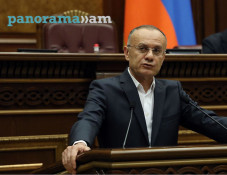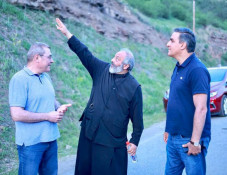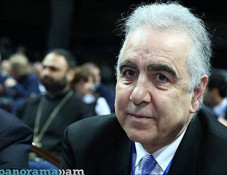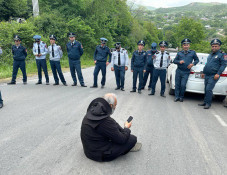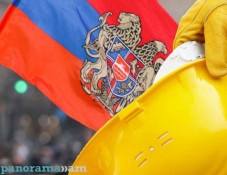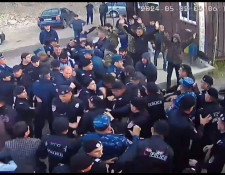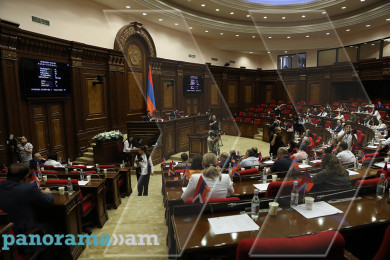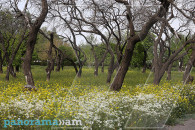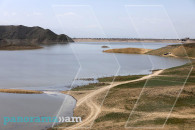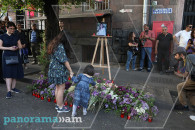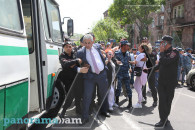
Aris Ghazinyan: Demonstration of tidy and civilized life of Armenians in Yerevan had provocative character for Tatar gangs
In the first quarter of the century before last, churches of Yerevan were profaned constantly; even after thirteen years since Yerevan had joined Russia, KhachaturAbovianwrote:“Now in Yerevan, in many churches, the eyes are taken out on the faces of saints, mouths are scraped off, and half of the face is torn off in some places. Many churches have their domes destroyed, doors and throne are scattered; manure in a sheep height is accumulatedin a gazin many churches, it covered the altar and blocked the door. Everyone, who approaches to the church to bow several times or enters into the church, has his soul burning and tearing to pieces, only thinking that if such barbarities were done to lifeless icons and stones, what the Christians had to face in those conditions.”Armenian journalist and researcher ArisGhazinyan writes about it in his book “Yerevan: with a cross or on the cross,” which is an attempt of setting and considering an extremely diverse range of processes directly or indirectly forming the character of the development of the territory in question and predetermining the inevitability of turning Yerevan into the main center of the Eastern Armenia, and later on into the capital of the recovered Armenian state.
Ghazinyan writes that at that time, gangs of “law enforcement officers” under thesardar’s control, in fact, organized bands of street cutthroats named "loti" appeared in the city. Being the peculiar forerunners of the future Blackshirts, they terrorized the Armenian population of Yerevan: they robbed, killed, raped, laid under tribute, extorted; in short, they created theconditions for the total outflow of the Christians from the city. According to the author, summer evenings and nights were especially horrible, when theloti gathered in the city from the northern provinces of Persia, set up a camp near the Red cliff, and started daily raids in the Armenian blocks.
Ghazinyan notes that the policy of displacing the Christians was framed by a certain “legal mounting”: for example, if the loti were considered criminal groups, the situation was different with hasases – state officials, who were the supervisors of craft and trade layers, market pavilions, and caravan-barns attached to the Market square. “Here racket already flourished on the state level: yasauls (the assistants of hasases) extorted the half of the daily income of the Christian population (the so-called beshkeks – presents, and rushfats - bribes)and ‘sent’ a considerable amount of that sum to a ‘trip’ up to the hierarchical ladder, up to the darukh,” he writes.
It is also noted that during HuseynKuli-khan’s rule, four canals attached to Christian blocks were filled up, as a result, there was an inevitable desertification of the land lots in the Ararat plain. “In such conditions, the Armenian population was practically deprived of the opportunity of starting activities in farms, which was the economic basis of the settled vital activities. By the 20s of the 19th century, only four relatively big canals built from Hrazdan arteries functioned in Yerevan–Dalmin, Mamre, Noragegh, Abukhayat,” the author writes.
Ghazinyan also describes the Muslim population of Yerevan, particularly, the Turkic-language tribal unions, which were a majority among the Muslims in Yerevan. “There is no ground to speak about a more or less organized community following a common scale of value directives. The nuance is that even in 1830, when the chairman of the Department of Revenue and the state-owned property of the Armenian Oblast, Ivan Chopin, directly dealt with that issue, he could not gain an understanding of that problem, he admitted,” he writes.
At first, Chopin intended to present a conglomeration of tribes separately. However, he later gave up that idea, as it was impossible to examine the whole motley palette, and he had to collect all the Altaians under a single “Tatar tent.” “Since the 11th century, <…> threatening hordes of wide tribes began to appear <…>Seljuqswerethefirsttoinvade Armenia,followed by Genghis Khan, and the last onewasTimur<…> During each of those three invasions, the sword mercilessly annihilated all the native citizens, who could not manage to escape and rescue themselves, and the winners settled in deserted and ruined colonies.Therefore, the Mohammedan population of the region was formed at different times and from different Tatar tribes,” Ghazinyan cites Chopin.
The author writes that with the strengthening of the Russian positions in the region, the Tatar “taifs” (he enumerates dozens of “taifs” in different chapters of the book) would stop behaving outrageously, and at last, would become law-abiding citizens of the empire. According to Ghazinyan,in this respect, Chopin’s reports about Erivan’s inhabitation by Armenians, whom he calls citizens, are significant, therefore, the city will soon “acquire the general look of theEuropean cities.” “Mostly, every decent house has a large garden, and there is a clean yard between the garden and the building. The yard is neatly paved with stone and shaded with ancient silk and walnut trees, and it has a stone pool with a water jet in the center.<…> The rooms are lit through huge lifting windows, which occupy the whole outward wall, and are composed of many-colored glasses forming quite beautiful patterns,”Ghazinyan cites Chopin.
Chopin admired the inner decoration of the houses of wealthy Armenians, who were decidedly disposed not to leave their city.He noted the walls of the houses covered with white and smooth plaster adorned with subtle stucco molding, which were able to serve as adornments for “even the best palaces of the European cities.”Contrary to the beauty and taste the Armenians’ houses were decorated with, Chopin notes the “disgusting viewoutside,” which, according to him, comes from “every owner’s fear of not to be considered wealthy.”
“Describing the decoration of the Armenian houses, Ivan Chopin also points to one of the main reasons of the contrast between the ‘outside’ and ‘inner’ city, and between the exterior and interior of the separate houses. During the period of the Erivan khanate’s existence, when the administrative levers were in Turks’ hands, and the lawlessness of the groups (taifa and loti) controlled by them broke all the possible borders, the demonstration of a tidy and civilized life had a provocative character being a defiant action,”Ghazinyan writes.
According to Ghazinyan, the gangs flooding the city felt the factor of the sardar power patronizing them, and any attempt of the native population to “defend their house” provoked new violations against Armenians in the city.
“Chopin focuses on the regional Turkic-Tatar population’sdisposition to change its positions depending on the current alignment of forces. The Persian and Turkic agents raided along the nomads’ camps provoking the citizens to rebellion. Karapapaks, Millis,Karachorlis, <…> and others were always ready: they had their weapons set, and horses saddled,” Ghazinyan writes.
“In these Armenians rules a strange trading spirit, one where they are involved in commerce travelling from the borders of China to the shores of Guinea where Crusoe’s shelter lies. This presents a rather intelligent and industrious people with unique roots, a people who can move from North to East and South to West within the old world and find genuine hospitality in whatever region they decide to stop in. It proves the superiority of their character, the original formation of which we are not able to study,”Immanuel Kant writes as cited by Ghazinyan.
“The contrast between the Armenians’ capability of adopting new lands and the cruel life conditions in their homeland created the most favorable conditions for the Christian population’s final outflow from the territory of the khanate,”Ghazinyan writes.
After the Treaty of Gulistan, Yerevan became an arena for cruel punishment of the Christian population, and it was Hasan khan, who was especially zealous in the barbaric amusement. His assistants – ataman of the Curds’ fanatics,Oguz-agha, and grandee Nagi-khan – were also worthy of him.
“Everyone, who entered Yerevan at that time, could think that there had been a flood, which destroyed the world <…>Not a day passed without people being caught in the mountains or steppe and taken to Hasan-khan. Everyone, who brought hostages, became his right hand <…> Hasan khan did not spend a day without killing people. And there were cases, when he woke up, performed his morning prayer, and immediately ordered to bring the unfortunate people to him <…>, he either gauged their eyes out himself or ordered to cut their hands and feet,” the author cites Abovyan.
Nevertheless, by the start of the new Russo-Persian war, around seven thousand people were still left in Yerevan. They were those, who continued to live in their native city despite the life conditions (more precisely, despite their absence). “We will never know if Yerevan could have remained intact, and become the Armenian capital, if those seven thousand Armenians did not stay there. This is exactly the case, when the city was saved not by geese and even the national voluntary movement, but by barbers with soap boilers…,”Ghazinyanassumes.
In the first quarter of the 19th century, Armenia was divided among three empires – Ottoman, Persian, and Russian. It is obvious that the frequent wars among the three powerful empires took place mostly in the “Armenian theatre,” and the Armenians were the nation, which was mostly involved in the military actions and interested in their results --a circumstance that nobody called in question.
In 1818, AlexanderGriboyedovwas chosen the secretary of the Russian legation in Persia. He went to Yerevan through Ijevan and Dilijan ravine, with which he had been “frightened very much” before.The Biblical Ararat opened to his eyes from the Kotaykvolcanic plateau not fragmentarily, but in all its splendor –from head to toe. Yerevan left a bad impression on him, and it could not be otherwise: ruins– the traces of the latest war, the unreasonable glorification of the sardar and his high suite by lackeys, and arbitrariness against the local population. The local authorities’ attempts to veil the real state of affairs before the Russian envoy obtained evenvulgar forms.
Griboyedov also cites sardar’s words about the Armenians oppressed by him and his power. They are “rightly,” as they could not dare “to criticize their supreme possessor.” According to Ghazinyan, the most important is that Griboyedov called Yerevan “the Armenian capital,” and wrote about it in his letter to Begichev: “We are in the Armenian capital, Erivan.”
To be continued
ArisGhazinyan’s “Yerevan: with a cross or on the cross” is a book about the social and political history of Yerevan and Yerevan district (as a habitat) since the declaration of Christianity to the beginning of XIX century. In addition to demonstrating historical facts based on archive documents and sources, the book also considers the fundamental theses of the Azerbaijani historiography and Pan-Turkic ideology aimed at appropriating the historical, cultural, and spiritual heritage of the Armenians and other nations of the region by falsifying their history.
Related news
- Aris Ghazinyan: In beginning of 19th century Armenian population had to survive and preserve “Armenian Yerevan”
- Aris Ghazinyan: Nobody challenged Yerevan’s status as perspective center of Armenian state
- Aris Ghazinyan: Hovsep Eminplanned to free Armenia from foreign yoke with Karabakh meliks’ European military trainings
- Aris Ghazinyan: Yerevan’s Blue Mosque was constructed during reign of Persian governors from Zand dynasty
- Aris Ghazinyan: Ottoman Sultan planned to pull down Etchmiadzin Cathedral to put end to everything Armenian
- Aris Ghazinyan: Every time Yerevan rose from ashes and ruins
- Aris Ghazinyan: People surviving in various districts of Biblical highland were gathering in Yerevan
- Aris Ghazinyan: Over 350,000 Armenians from different regions deported into Persia on Abbas I’s order
- Aris Ghazinyan: Seeing Armenians’ well-ordered lands, Abbas I started working out plans of using Armenian resource in economic development of country
- Aris Ghazinyan: Armenian kingdoms appeared and disappeared in Ararat country, but Armenian element always dominated here
- Aris Ghazinyan: Timur took thousands of Armenians out of Armenia to develop crafts and trade in his empire
- Aris Ghazinyan: Yerevan became place of pilgrimage for Christians since late 13th century
- Aris Ghazinyan: Average seventh-century inhabitant of Yerevan embodied collective image of the Armenian of that time
- Aris Ghazinyan: Territory of Yerevan generates unlimited time in its limited borders
- Aris Ghazinyan: According to famous anthropologists, Armenians are descendants of ancient indigenous race, which preserved its type from any influence
- Aris Ghazinyan: According to orientalist Diakonoff's memories, most of Azerbaijani historians had “quite indirect relation” to science
- Aris Ghazinyan: Politicians and scientists in Turkey and Azerbaijan completely ignore primary sources on Yerevan history
- Aris Ghazinyan: Past and future in Azerbaijan are modeled upon decrees and program speeches of president
Newsfeed
Videos






